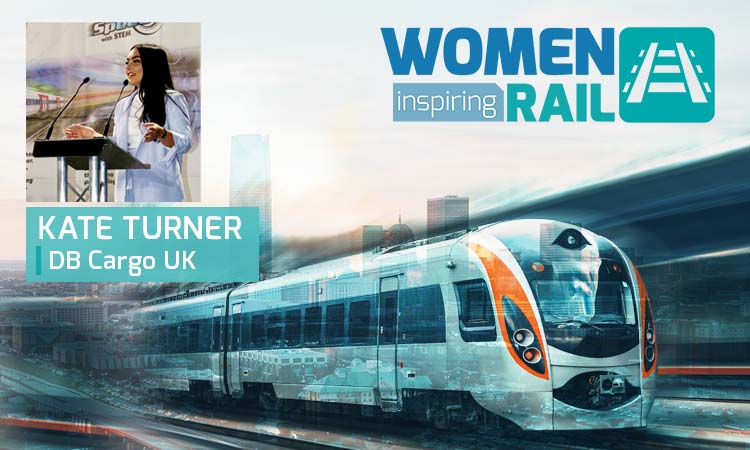Women Inspiring Rail: A Q&A with Kate Turner, DB Cargo UK
Posted: 16 July 2019 | Kate Turner (DB Cargo UK) | No comments yet
For the latest instalment of Global Railway Review’s Women Inspiring Rail series, we spoke to Kate Turner, who’s rollercoaster career of just seven years has seen her go from apprentice to Head of Planning at DB Cargo UK.

How did your career in rail begin and what does your current job involve?
My railway career began when I finished my A Levels. I achieved three A* grades and I applied for multiple universities, but at the same time, I also happened to look on the apprenticeship website, and just by chance, or maybe fate, DB Schenker was advertising for an apprenticeship role. My brother had joined the company six months prior to this as a ground staff member, so, after speaking to him and seeing what a fantastic opportunity it would be to join the rail industry, I applied for it and I had the interview on my 18th birthday. That’s the youngest age at which you can join so I was literally on the cusp for applications. It honestly felt as though fate had intervened. I had the interview and they phoned me the same day to say I’d got the job and I started in July 2012.
My initial role was as a planning and resource one-year apprenticeship which entailed three months planning trains, three months diagramming trains, three months on roster – putting drivers against jobs – and the final three months working 12-hour shifts on control. Six months into my apprenticeship I was seconded to a fantastic opportunity to work for the HR Director. I had to lead a recruitment and training plan for train drivers which involved bringing them in on what we call ‘straight to see’. This meant bringing people who had never been in the rail industry before into DB, training them and ensuring that the company had a sufficient number of train drivers through the recruitment plan.


Kate with her everywoman Freight Transport and Logistics Award
I recruited 117 train drivers despite only having six months’ experience, which was quite a big job. During this time I was also offered the opportunity to learn how to drive a train. That was a fantastic opportunity! Although I didn’t complete the course to become a qualified train driver, I did master the majority of it. It has been a fantastic learning curve over the past seven years.
I then went for my first management position – the role of a Rail Solutions Manager. This included leading a small team. As I recall there were only about five people in that team, and we worked to identify any efficiencies or improve the lengths of trains, completing trials that the industry had never seen before. We managed to decrease the cost of one particular flow train by £250,000.
I held this role for nine months, then in January 2017 applied for the position I currently hold – Head of Planning. I have 35 members of staff; we plan, diagram and link around 2,000 moves every single week. It’s a huge responsibility but it’s been a fantastic opportunity. January 2020 will mark my third year in the job and I’ve now got a fantastic team with me. In the rail industry you become quite like a family because you spend more time with them than you do with the little ones at home. I won the 2018 Above and Beyond Freight Award at the everywoman in Transport and Logistics Awards. There were huge organisations there such as Amazon and DHL.
What aspects of your job do you find most challenging and rewarding?
In terms of rewarding, I’d probably say that would be something as simple as planning a train on a computer screen, and then going out to see that train running in real life. It gives me a real sense of satisfaction and motivation, knowing that my team and I have achieved it. It is very rewarding to know that my team have actually transported a product for a UK industry, whether that product is petrol, construction material or cars, or indeed anything that we move – we are responsible for completing that.
If I’m honest, when I first joined DB Schenker I was part of a cohort of three apprentices appointed at the time, and it was the first apprenticeships they’d ever given. The average age within the company, I think, was just under 50 years old.
At the time, I walked into an office headquarters where I was an anomaly, it was not the norm. Over the past seven years, the company has progressed and now recruits 100 apprentices a year. It has completely changed, and the culture inside the headquarters of which I’m based has completely changed as well. When I first started, my self-belief and respect came from others, but it soon changed – I started asking myself what I could overcome and what I could deliver. And this was strengthened by the opportunities that were presented before me.
What is it about the rail industry that you are most passionate about?
The rail industry, although it’s quite big, in terms of people seems very small, because you end up knowing everyone. If you don’t know the answer, someone else will; that’s the brilliant thing about the rail industry and probably the greatest thing for me.
There are two strands to my answer for this; number one being the people who work within the rail industry, as it is the people that make it what it is. The work is very detailed and stressful in some cases, but everyone behaves like a family. The rail industry, although it’s quite big, in terms of people seems very small, because you end up knowing everyone. If you don’t know the answer, someone else will; that’s the brilliant thing about the rail industry and probably the greatest thing for me.
In terms of passion, I’d say at the top of my list is my involvement with Women in Rail. I give many presentations each year, not just for Women in Rail, but presenting about the next generation of rail freight. I’m very passionate about ensuring that, in my career, if I stay within the rail industry, we see the next generation come through, no matter what route they choose to come into the industry.
Finally, I’d say doing a good job and delivering what myself and my team have said we will deliver makes me passionate to keep excelling.
What’s the biggest achievement or proudest moment of your career?
My biggest achievement would probably be becoming Head of Planning, which is a director/senior management position. At 22-years-old, I was the youngest person ever in DB group in Europe to achieve this grade, and I had just under 100 people working for me.
Also, it was fantastic to win the 2018 everywoman in Transport and Logistics Award, but moreover it’s the effect of a cultural change through the idea that actually a 22-year-old can do a job like this.
How has the rail industry evolved and changed, and what have been the biggest changes that you’ve witnessed throughout your career?
I would say that the biggest change is the average age – from when I first started there has been such a cultural change. Irrespective of what age or gender you are, if someone can deliver what they promise, then they can clearly do the job. When I joined the company seven years ago, being in the first intake of apprentices, it was probably a risk for the company to take, but a risk that has paid off.
Who within the rail community has been an inspiration to you and why?
I would say I’ve had some fantastic leaders within DB and people who I will look up to and follow for the rest of my career.
I often follow other successful women in the rail industry, even on platforms such as LinkedIn. Louise Cheeseman from Hull Trains springs to mind. There are even individuals within DB; the women that have been in a senior role that I’ve watched, and taken tips and ideas from, have also been a great source of inspiration. I’ve also had backing from CEOs which has been an enormous help because if someone who is that senior within the company believes in what you do and what you’re trying to do, it gives you an opportunity to shine.
What can be done, do you think, to diversify the workforce in the rail sector, and what advice would you give to those thinking about pursuing a career in rail now?
I would say it starts when children are doing their work experience placements. I think the rail industry should put our names on that list for people to see that we have opportunities for work experience placements, for graduate schemes and euroTRAIL placements. There are all sorts of different opportunities and I think it’s imperative to get the message out to even younger people. Quite often, by the age of 20 or 21 when students are coming out of university or college, they have already made up their minds as to what they want to do. I believe it’s a case of planting the seed earlier.
We need to encourage people, no matter what age or gender, to really start thinking differently and to realise that “actually, the rail industry is huge.”
In terms of diversity, I’m quite lucky. DB influenced me to go and stand in schools and go to the High Speed Rail College to present and showcase what someone young, who’s a woman in a male orientated industry, can achieve. If other rail sectors could do the same and get the message out, then I think it would have a far reaching influence. We need to encourage people, no matter what age or gender, to really start thinking differently and to realise that “actually, the rail industry is huge.” I think we’re a hidden industry and we need to do more for ourselves to prove that we are just as exciting as other professions and that cultural change is happening all the time.
If you would like to take part in the Women Inspiring Rail series, or would like to nominate a colleague to part, please email: Craig Waters, Editor, Global Railway Review.






